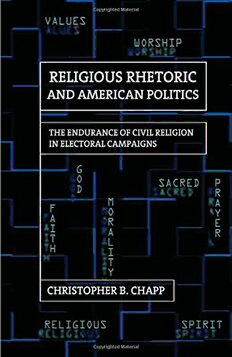
Religious Rhetoric and American Politics: The Endurance of Civil Religion in Electoral Campaigns PDF
Preview Religious Rhetoric and American Politics: The Endurance of Civil Religion in Electoral Campaigns
RELIGIOUS RHETORIC AND AMERICAN POLITICS Religious Rhetoric American Politics and The Endurance of Civil Religion in Electoral Campaigns Christopher B. Chapp Cornell University Press Ithaca & London Copyright © 2012 by Cornell University All rights reserved. Except for brief quotations in a review, this book, or parts thereof, must not be reproduced in any form without permission in writing from the publisher. For information, address Cornell University Press, Sage House, 512 East State Street, Ithaca, New York 14850. First published 2012 by Cornell University Press Printed in the United States of America Library of Congress Cataloging-in-Publication Data Chapp, Christopher B., 1979– Religious rhetoric and American politics : the endurance of civil religion in electoral campaigns / Christopher B. Chapp. p. cm. Includes bibliographical references and index. ISBN 978-0-8014-5126-3 (cloth : alk. paper) 1. Religion and politics—United States. 2. Rhetoric—Religious aspects—Christianity. 3. Rhetoric—Political aspects—United States. 4. Identity politics—United States. 5. Civil religion—United States. 6. Political campaigns—United States. I. Title. BL2525.C443 2013 324.7—dc23 2012016338 Cornell University Press strives to use environmentally responsible suppliers and materials to the fullest extent possible in the publishing of its books. Such materials include vegetable-based, low-VOC inks and acid-free papers that are recycled, totally chlorine-free, or partly composed of nonwood fi bers. For further information, visit our website at www.cornellpress.cornell.edu. Cloth printing 10 9 8 7 6 5 4 3 2 1 For Jolene and Cecilia CONTENTS List of Illustrations viii Preface ix 1. A Theory of Religious Rhetoric in American Campaigns 1 2. Religious Rhetoric in American Political History 17 3. Religious Rhetoric and the Politics of Identity 39 4. Religious Rhetoric and the Politics of Emotive Appeals 61 5. The Consequences of Religious Language on Presidential Candidate Evaluations 81 6. Civil Religion Identity and the Task of Political Representation 104 7. The Rhetorical Construction of Religious Constituencies 131 Notes 139 References 155 Index 169 vii ILLUSTRATIONS Figures 1.1. Causes and consequences of religious political rhetoric 3.1. Frequency of religious rhetoric in presidential campaigns 3.2. Frequency of identity cues in religious rhetoric 3.3. Pluralistic and shared religious rhetoric, by identity cue 3.4. Culture wars rhetoric as a vehicle to convey a moral crisis 4.1. Emotive appeals in religious rhetoric and secular campaign speech 4.2. Emotive appeals by identity type 4.3. Partisan differences in emotive religious rhetoric 5.1. Religious commitment and change in candidate evaluation by level of civil religion rhetoric, 1980–2004 5.2. Religious rhetoric and change in candidate evaluation 5.3. Angry and opponent-directed religious cues 5.4. Anxious and opponent-directed religious cues 5.5. Enthusiastic religious cues 6.1. Civil religion identity in the American public 6.2. Issue and image salience by level of civil religion identity 6.3. “Pride in country” and “a candidate like me” by level of civil religion identity 6.4. Vote choice by rhetorical cues and Christian identity 6.5. Vote choice by rhetorical cues and civil religion identity 6.6. Self-monitoring and the normative social pressure applied by civil religion rhetoric Table 6.1. Religious cues and the religious basis of candidate evaluation viii PREFACE In spring 2011, I attended a speech by Representative Keith Ellison (D- Minn.) at an interfaith dialogue at St. Olaf College in Northfi eld, Minnesota. Ellison’s talk occurred just a few weeks after he had taken part in controver- sial congressional subcommittee hearings that had been called to investigate “The Extent of Radicalization in the American Muslim Community and that Community’s Response.” As the fi rst Muslim American elected to Congress, Ellison expressed regret over the “premise of the hearings.” His comments at the interfaith event, however, carried a tenor far different from the sectarian pitch that had surrounded much of the hearings. Refl ecting on the found- ing of the nation, Ellison remarked, “We the people, create our nation to establish Justice, insure domestic Tranquility, promote the general Welfare, and secure the Blessings of Liberty. People make a mistake when they say that when these words were written they were not true. I say they weren’t true y et. I say they were our aspiration. An America to be hoped for and to be worked for. An Amer ica that has to be built and is being built by all of us. I look at these words, and I refl ect upon them, and I think about them as America’s prayer. ” Ellison’s remarks go further than simply calling for religious tolerance and putting aside religious differences by suggesting that there is some- thing sacred within American political institutions. The Constitution is to be interpreted not just as a blueprint for democracy but as a prayer for the American people. This prayer, as Ellison characterized it, does not favor any particular denomination or sect. Rather, Ellison’s speech pro- moted a spiritualized understanding of American political institutions and culture—an understanding that could resonate across d enominational divides. In short, Ellison’s reading conceived of the Constitution as a reli- gious document by invoking prayer in a universalistic manner. As I listened to Ellison’s remarks, it was clear that this characterization of American politics struck a chord with the vast majority of the audience at a Lutheran-affi liated liberal arts college. Ellison found, in this civil religion understanding of the U.S. Constitution, a point of commonality that appeared to be both deeply heartfelt by the audience and inclusive ix
